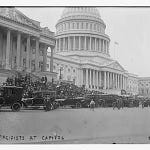The federal government has ended COVID-19 border restrictions known as Title 42, which blocked many migrants at the border with Mexico. These restrictions have been replaced with a new asylum regulation aimed at deterring illegal crossings. However, legal challenges have been filed against the new asylum bars, with advocates arguing that they violate U.S. laws and international agreements. The new regulation implemented by President Joe Biden is seen by some as resembling the restrictions imposed by former President Donald Trump. Chaotic scenes have unfolded at the border as migrants rushed to enter the country before the new rule took effect. The new regulation presumes that most migrants are ineligible for asylum if they did not seek protection in other nations first or failed to use legal pathways for entry. Thousands of migrants have attempted to enter the U.S. by crossing rivers, climbing walls, and scrambling up embankments. The Biden administration has defended the regulation, stating that it seeks to incentivize migrants to use lawful pathways for entry. Title 42 was first implemented by Trump in 2020 to curb the spread of COVID-19 in detention facilities and allowed for the quick expulsion of migrants. Biden kept Title 42 in place and expanded it. Republicans have criticized Biden's immigration policies, while Biden has blamed Congress for not passing comprehensive immigration reform. The Biden administration has been trying to send a message that illegal crossers will face consequences, deploying additional personnel to the border. Despite the end of Title 42 and the COVID public health emergency, the U.S. has been dealing with record numbers of migrants at the border, straining authorities and border cities.
Legal challenges threaten Biden's border plan as Title 42 ends | Reuters
A federal judge in Virginia has ruled that federal laws prohibiting the sale of handguns to individuals under the age of 21 violate their constitutional rights to possess firearms. The ruling, which is expected to be challenged by the Justice Department, will not take effect until the judge, Robert Payne, issues his final order in the coming weeks. The ruling will not impact the 19 states that already have their own laws prohibiting handgun sales to those under 21. The judge referenced the Supreme Court's recent expansion of gun rights in his decision. Gun rights are a contentious issue in the United States, with high levels of firearm violence and mass shootings. There have been at least 210 mass shootings in 2023 so far, according to the Gun Violence Archive. The decision was welcomed by the attorney representing the plaintiffs, who expressed optimism that the ruling would be affirmed.
US judge strikes down federal law barring handgun sales to those under 21 | Reuters
Goldman Sachs has reached a $215 million settlement in one of the largest sex discrimination cases on Wall Street, which has the potential to bring about greater gender equality in the financial industry. The settlement is a victory for more than 2,800 female associates and vice-presidents who accused the bank of paying women less than their male counterparts and denying them opportunities for advancement. But a settlement isn’t without its downsides – by avoiding a trial, Goldman Sachs prevents damaging information about its employee evaluation and promotion processes from being revealed in court. As part of the settlement, an independent expert will investigate the bank's practices and conduct a pay-equity review for the next three years. The settlement could have a ripple effect on Wall Street, where gender discrimination and inequality have persisted for decades. Advocates hope that this landmark settlement signals a willingness by the industry to address gender inequality more effectively. However, the case has been a hard-fought battle, lasting nearly 13 years and requiring significant resources. The use of mandatory arbitration agreements in workplace disputes, which limit workers' ability to seek justice collectively, has also drawn criticism. Further legislative action is needed to curtail the use of arbitration agreements in other work-related disputes. The Goldman Sachs case highlights the importance for employers to regularly review their compensation, evaluation, and promotion practices to ensure they do not have a discriminatory impact on protected classes of workers.
Goldman’s Sex-Bias Deal Is ‘Milestone’ for Women on Wall Street
German foundation Wau Holland has hired Squire Patton Boggs, a global law and public policy firm, to lobby the US Department of Justice (DOJ) on behalf of WikiLeaks publisher Julian Assange. The foundation has paid Squire at least $1.2 million since October 2022 to advocate for journalists' rights to publish classified information. The firm aims to discuss the compatibility of Assange's espionage charges with Attorney General Merrick Garland's policy to protect journalists from enforcement actions. Although there is no evidence of progress in arranging a meeting with DOJ officials, this lobbying effort represents Squire's most lucrative federally-disclosed work in the past six months. Advocates for press freedom and civil liberties, major news outlets, and progressive members of the House have raised concerns about extraditing Assange to the US and putting him on trial, citing potential threats to First Amendment rights. Squire Patton Boggs declined to comment on the matter, while the DOJ and Wau Holland Foundation also did not provide comments.
Assange Allies Turn to Squire Patton Boggs to Help Lobby DOJ
Crypto lender BlockFi has received court approval to return $297 million to customers with non-interest-bearing accounts. The ruling by U.S. Bankruptcy Judge Michael Kaplan stated that customers owned their deposits in BlockFi's Wallet program, which kept customer deposits separate from the company's other funds and did not pay interest. However, customers with interest-bearing accounts did not own their deposits, which were considered part of BlockFi's lending business and were subject to being pooled with other assets in bankruptcy proceedings. BlockFi, which filed for Chapter 11 protection in November, froze accounts shortly before the filing, creating confusion among customers. Despite receiving confirmation that their transfers were complete, customers who attempted to move $375 million from interest-bearing accounts to Wallet accounts will not have their funds returned. BlockFi's terms of service allowed it to block transfer requests during the shutdown. The decision aims to protect the recovery for Wallet customers and ensure the return of customer funds from a fixed pool of assets.
BlockFi gets court permission to return $297 million to Wallet customers | Reuters
Microsoft is set to defend its planned $69 billion acquisition of Activision Blizzard in a private antitrust lawsuit filed by video gamers who argue that the deal will harm industry competition. The hearing, taking place in San Francisco federal court, will determine whether a preliminary injunction should be issued to block the acquisition. Microsoft's lawyers have argued that the plaintiffs' request is unprecedented and have asked the court to deny the injunction. The deal, announced in January 2022, is also facing regulatory scrutiny from various competition law enforcers, including the U.S. Federal Trade Commission and Britain's antitrust regulator, which has already stated its intention to block the acquisition. The plaintiffs' lawyers are urging the court to block the deal to allow a trial on the merits of the acquisition to proceed. The case is being closely watched as it raises significant questions about competition in the gaming industry.
Microsoft to defend Activision deal in gamers' lawsuit in US court | Reuters













